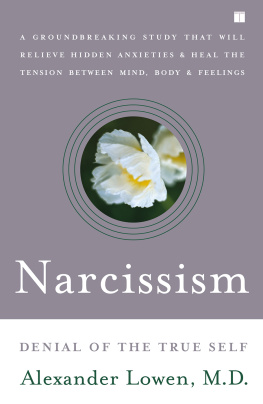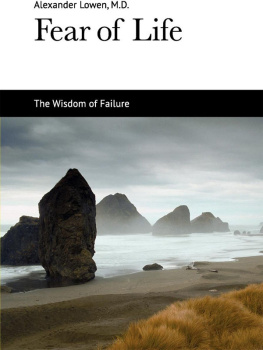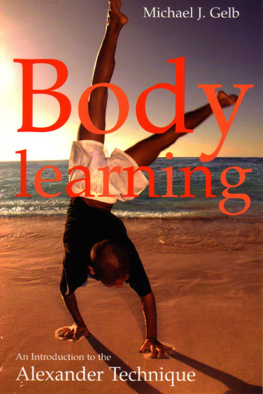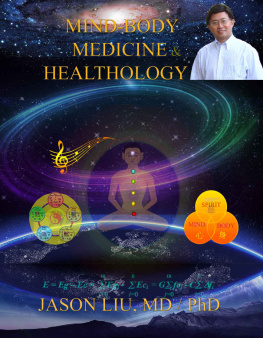Alexander Lowen - The Betrayal of the Body
Here you can read online Alexander Lowen - The Betrayal of the Body full text of the book (entire story) in english for free. Download pdf and epub, get meaning, cover and reviews about this ebook. year: 2012, publisher: The Alexander Lowen Foundation, genre: Science. Description of the work, (preface) as well as reviews are available. Best literature library LitArk.com created for fans of good reading and offers a wide selection of genres:
Romance novel
Science fiction
Adventure
Detective
Science
History
Home and family
Prose
Art
Politics
Computer
Non-fiction
Religion
Business
Children
Humor
Choose a favorite category and find really read worthwhile books. Enjoy immersion in the world of imagination, feel the emotions of the characters or learn something new for yourself, make an fascinating discovery.

- Book:The Betrayal of the Body
- Author:
- Publisher:The Alexander Lowen Foundation
- Genre:
- Year:2012
- Rating:5 / 5
- Favourites:Add to favourites
- Your mark:
- 100
- 1
- 2
- 3
- 4
- 5
The Betrayal of the Body: summary, description and annotation
We offer to read an annotation, description, summary or preface (depends on what the author of the book "The Betrayal of the Body" wrote himself). If you haven't found the necessary information about the book — write in the comments, we will try to find it.
The Betrayal of the Body — read online for free the complete book (whole text) full work
Below is the text of the book, divided by pages. System saving the place of the last page read, allows you to conveniently read the book "The Betrayal of the Body" online for free, without having to search again every time where you left off. Put a bookmark, and you can go to the page where you finished reading at any time.
Font size:
Interval:
Bookmark:
Books by Alexander Lowen, M.D.
The Language of the Body (1958)
Love and Orgasm: A Revolutionary Guide to Sexual Fulfillment (1965)
The Betrayal of the Body (1967)
Pleasure: A Creative Approach to Life (1970)
Bioenergetics: The Revolutionary Therapy That Uses the Language of the Body to Heal the Problems of the Mind (1976)
Depression and the Body: The Biological Basis of Faith and Reality (1977)
The Way to Vibrant Health: A Manual of Bioenergetic Exercises, co-author Leslie Lowen (1977)
Fear of Life (1980)
Narcissism: Denial of the True Self (1984)
Love, Sex, and Your Heart (1988)
The Spirituality of the Body: Bioenergetics for Grace and Harmony (1990)
Joy: The Surrender to the Body and to Life (1995)
Honoring the Body: The Autobiography of Alexander Lowen, M.D. (2004)
The Voice of the Body: Selected Public Lectures 1962-1982 (2005)
Alexander Lowen, M.D.
The Alexander Lowen Foundation
www.lowenfoundation.org
1852 Texas Hill Rd.,
Hinesburg, VT 05461 USA
Phone: 802-338-2866
The Betrayal of the Body
Published by The Alexander Lowen Foundation
1852 Texas Hill Road
Hinesburg, VT 05461 USA
Phone: 802-338-2866
www.lowenfoundation.org
Copyright 1967 by Alexander Lowen, M.D.
All rights reserved. No part of this book may be reproduced or transmitted in any form or by any means, electronic or mechanical, including photo-copying, recording or by any information storage and retrieval system, without permission in writing from the Publisher.
Except in the United States of America, this book is sold subject to the condition that it shall not, by way of trade or otherwise, be lent, re-sold, hired out, or otherwise circulated without the publisher's prior consent in any form of binding or cover other than that in which it is published and without a similar condition including this condition being imposed on the subsequent publisher.
Library of Congress Control Number 2004106826
ISBN 978-1-938485-00-8 (paperback)
ISBN 978-1-938485-01-5 (ebook)
First Edition by The Alexander Lowen Foundation, 2012
Printed in the United States of America
TO MY PATIENTS
Whose courage to confront their terror and despair inspires these pages
Contents
The Problem of Identity
Normally, people don't ask themselves, Who am I? One's identity is taken for granted. Each person carries in his wallet papers that serve to identify him. Consciously, he knows who he is. However, below the surface a problem of identity exists. On the border of consciousness he is disturbed by dissatisfactions, uneasy about decisions, and tormented by the feeling of missing out on life. He is in conflict with himself, unsure of his feelings, and his insecurity reflects his problem of identity. When dissatisfaction becomes despair and insecurity verges on panic an individual may ask himself, Who am I? This question indicates that the facade through which a person seeks identity is crumbling. The use of a facade or the adoption of a role as a means to achieve identity denotes a split between the ego and the body. I define this split as the schizoid disturbance which underlies every problem of identity.
For example, a famous artist walked into my office and said, I am confused and desperate. I don't know who I am. I walk down the street and ask myself, Who are you?
It would have been meaningless to reply, You are the well-known painter whose work hangs in many museums. He knew that. What he complained of was a loss of the feeling of self, the loss of contact with some vital aspect of existence that gives meaning to life. This missing element was an identification with the body, the foundation upon which a personal life is erected. My artist patient became actively aware of this missing element in a dramatic experience. He told me:
The other day I looked in the mirror, and I became frightened when I realized it was me. I thought, This is what people see when they look at me.
The image was a stranger. My face and my body didn't seem to belong to meI felt very unreal.
This experience, in which there is a loss of feeling of the body, with accompanying sensations of strangeness and unreality, is known as a depersonalization. It denotes a break with reality and occurs in the first stages of a psychotic episode. If it continues, the person loses not only the feeling of identity but also his conscious awareness of identity. Fortunately, this episode was short-lived in my patient. He was able to reestablish some contact with his body, so that the feeling of unreality disappeared. However, his identification with his body remained tenuous, and the problem of his identity persisted.
The feeling of identity stems from a feeling of contact with the body. To know who one is, an individual must be aware of what he feels. He should know the expression on his face, how he holds himself, and the way he moves. Without this awareness of bodily feeling and attitude, a person becomes split into a disembodied spirit and a disenchanted body. I will return again to the case of the artist.
As he sat opposite me, I saw his drawn face, his empty eyes, his tightly set jaw, and his frozen body. In his immobility and shallow breathing, I could sense his fear and panic. He, however, was not aware of the gauntness of his face, the blankness of his eyes, the tension in his jaw, or the tightness of his body. He did not feel his fear and panic. Being out of touch with his body, he only sensed his confusion and desperation.
The complete loss of body contact characterizes the schizophrenic state. Broadly speaking, the schizophrenic doesn't know who he is, and is so much out of touch with reality that he cannot even phrase the question.
On the other hand, the schizoid individual knows he has a body and is, therefore, oriented in time and space. But since his ego is not identified with his body and does not perceive it in an alive way, he feels unrelated to the world and to people. Similarly, his conscious sense of identity is unrelated to the way he feels about himself. This conflict does not exist in a healthy person whose ego is identified with his body and in whom the knowledge of his identity stems from the feeling of the body.
A confusion of identity typifies most persons in our culture. Many people struggle with a diffused sense of unreality about themselves and their lives. They become desperate when the ego image they have created proves empty and meaningless. They feel threatened and become angry when the role they have adopted in life is challenged. Sooner or later, an identity based on images and roles fails to provide satisfaction. Depressed and discouraged, they consult a psychiatrist. Their problem is, as Rollo May points out, the schizoid disturbance.
Many psychotherapists have pointed out that more and more patients exhibit schizoid features and the typical kind of psychic problem in our day is not hysteria, as it was in Freud's time, but the schizoid typethat is to say, the problem of persons who are detached, unrelated, lacking in affect, tending towards depersonalization, and covering up their problems by means of intellectualizations and technical formulations.
There is also plenty of evidence that the sense of isolation, the alienation of one's self from the world is suffered not only by people in pathological conditions, but by countless normal persons as well in our day.
The alienation of people in the modern worldthe estrangement of man from his work, his fellow man, and himselfhas been described by many authors and is the central theme of Erich Fromm's writings. The alienated individual's love is romanticized, his sex is compulsive, his work is mechanical, and his achievements are egotistic. In an alienated society, these activities lose their personal meaning. This loss is replaced by an image.
Font size:
Interval:
Bookmark:
Similar books «The Betrayal of the Body»
Look at similar books to The Betrayal of the Body. We have selected literature similar in name and meaning in the hope of providing readers with more options to find new, interesting, not yet read works.
Discussion, reviews of the book The Betrayal of the Body and just readers' own opinions. Leave your comments, write what you think about the work, its meaning or the main characters. Specify what exactly you liked and what you didn't like, and why you think so.











